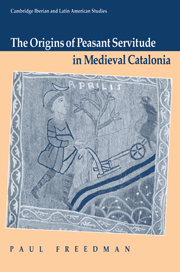Book contents
- Frontmatter
- Contents
- List of tables
- Preface
- List of abbreviations
- Map 1 Densities of Remença households at the end of the Civil War
- Map 2 Catalan comarcas and principal towns
- Map 3 Pyrenees and pre-Pyrenees
- 1 Introduction: medieval serfdom and Catalonia
- 2 Enduring characteristics of rural Catalonia
- 3 The free peasants of the ninth to eleventh centuries
- 4 Changes in the status of peasants: late twelfth and early thirteenth centuries
- 5 Catalan servitude in the thirteenth century
- 6 Effects of the Black Death
- 7 Peasant agitation and civil war, 1388–1486
- Conclusion: origins of Catalan servitude
- Appendix 1
- Appendix 2
- Appendix 3
- Appendix 4
- Bibliography
- Index
3 - The free peasants of the ninth to eleventh centuries
Published online by Cambridge University Press: 06 January 2010
- Frontmatter
- Contents
- List of tables
- Preface
- List of abbreviations
- Map 1 Densities of Remença households at the end of the Civil War
- Map 2 Catalan comarcas and principal towns
- Map 3 Pyrenees and pre-Pyrenees
- 1 Introduction: medieval serfdom and Catalonia
- 2 Enduring characteristics of rural Catalonia
- 3 The free peasants of the ninth to eleventh centuries
- 4 Changes in the status of peasants: late twelfth and early thirteenth centuries
- 5 Catalan servitude in the thirteenth century
- 6 Effects of the Black Death
- 7 Peasant agitation and civil war, 1388–1486
- Conclusion: origins of Catalan servitude
- Appendix 1
- Appendix 2
- Appendix 3
- Appendix 4
- Bibliography
- Index
Summary
Elementary accounts of European medieval history depict the ninth and tenth centuries as a time of invasions and the breakdown of government. The disorders are seen as provoking a system of dependence, the beginning of feudalism. Powerful warlords forced the militarily unfit to seek protection and a fundamental division was supposedly created between nobles and a largely servile peasantry.
In recent decades, this picture has been greatly altered. The rise of aristocratic military domination and the consequent decline of free peasant tenures has been placed later and is regarded as the result of internal changes in the European economy and society, not the turmoil of invasions. Carolingian disorders now appear to have created an opportunity for peasants, clearing away the great estates and systems of large-scale cultivation, ushering in a dangerous but invigorating age of liberties. It was the feudal crisis of the eleventh and twelfth centuries that undermined rural freedom, because public authority ceased to be able to guarantee the independence and security of small proprietors. The nobles, by means of force radiating from their castles, imposed not only economic power but also private jurisdiction on the countryside.
This chapter looks at the pioneering age, the ninth and tenth centuries, and the aristocratic uprisings in Catalonia between 1020 and 1060 that undermined the favorable conditions of tenure. We shall here consider the establishment of rural society during a period of resettlement in what were, more literally than elsewhere, frontier conditions.
- Type
- Chapter
- Information
- The Origins of Peasant Servitude in Medieval Catalonia , pp. 56 - 88Publisher: Cambridge University PressPrint publication year: 1991



